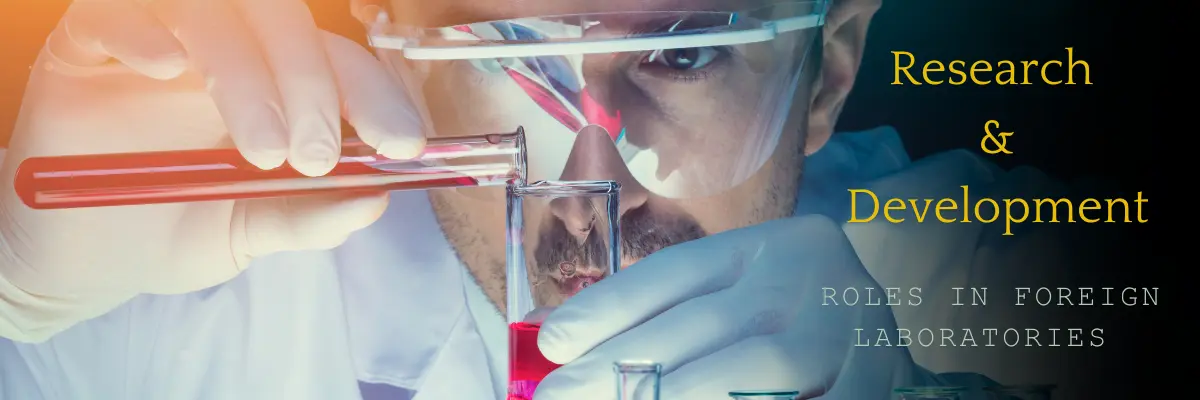06 Jul 2024 | Research and Development Roles in Foreign Laboratories
0
130
The Significance of Research and Development Roles
In light of these continuous improvements in the fields of science and technology all over the world, job positions for Research and Development in foreign laboratories have emerged as some of the most sought-after career goals for many individuals intending to pursue their scientific careers as scientists or engineers. These positions are not only a chance to participate in new developments but also an excellent opportunity to cooperate with external counterparts and personal growth. In this article, we will concern with the various features of R&D positions in foreign laboratories, the advantage of the jobs, and the ways by which students can prepare themselves to avail the opportunities.
The Impact of R&D on Global Innovation
Research and Development are some of the most important positions in the world today as they are major drivers of change and development. They are expected to create new products, new technologies, new ideas, and new processes that may change the face of industries and overall living standards. R&D Specialists are employed in various fields including pharmaceuticals, biotechnology, information technology and the environment industries that generate knowledge through which society is transformed.
Key Areas of Contribution
- Pharmaceuticals: Development of new drugs and treatments.
- Biotechnology: Innovations in genetic engineering and bioinformatics.
- Information Technology: Advancements in artificial intelligence and cybersecurity.
- Environmental Science: Solutions for climate change and sustainability.
Opportunities for Careers in Foreign Laboratories
Why Pursue R&D Roles Abroad?
It is crucial to understand that there are several advantages of searching for R&D jobs in laboratories in other countries. In developed countries, labs contain costly machinery, sufficient capital, and ethnically diverse workforce population. These are the factors that promote creativity as well as escalate a career within a firm.
Benefits of Working in International R&D Labs
- Access to Advanced Technology: Exposure to the latest scientific instruments and methodologies.
- Collaboration with Experts: Networking with leading scientists and researchers from around the world.
- Enhanced Career Prospects: Opportunities for career advancement and recognition in the global scientific community.
Types of R&D Roles Available
Research and Development positions in foreign laboratories may differ significantly from each other depending on the subject of research and the objectives of a certain laboratory.
Common R&D Positions
- Research Scientist: Carries out lab tests and evaluates their findings to design additional products or procedures.
- Development Engineer: Emphasises how the generated knowledge can be used to develop solutions for real problems.
- Lab Technician: Provides technical support for experiments and maintains laboratory equipment.
- Project Manager: Responsible for providing project management over the R &D projects so as to complete them on schedule and within the specified budget.
- Regulatory Affairs Specialist: Ensures compliance with international regulations and standards.
Preparing for a Career in R&D Abroad
Educational Requirements
Education is the key to employment in the R&D field, particularly when getting a job in a foreign laboratory. Almost all R&D positions demand candidates to possess not less than a master’s degree and while applying for most of the positions, a Ph.D is preferred in the area of specialization.
Recommended Fields of Study
- Biochemistry: For roles in pharmaceuticals and biotechnology.
- Computer Science: For positions in IT and cybersecurity.
- Environmental Science: For careers focused on sustainability and climate research.
- Mechanical Engineering: For development engineering roles.
Gaining Relevant Experience
It is therefore important to note that it is only through actual experience that one can secure an employment with a foreign laboratory. It is suggested to gain work experience in form of internships, research assistant positions, as well as to participate in relevant projects.
Ways to Gain Experience
- Internships: Seek internships at research institutions or companies with active R&D departments.
- Research Projects: Participate in or initiate research projects during your studies.
- Workshops and Conferences: Attend scientific workshops and conferences to stay updated on the latest developments and network with professionals.
Finding R&D Job Opportunities
Job Search Strategies
Candidature seeking for R&D positions in foreign laboratories for instance is not an easy task. These strategies will help you in your job search:
Effective Job Search Methods
- Online Job Portals: Use websites like LinkedIn, Indeed, and Glassdoor to find job listings.
- University Career Services: Leverage the resources and connections provided by your university’s career center.
- Professional Networks: Join professional associations related to your field and attend their events.
- Direct Applications: Research foreign laboratories and companies and apply directly through their career portals.
Tailoring Your Application
In the case of R&D jobs, it is crucial to incorporate the information submitted in the application process to reflect the skills and experience necessary in the position. resumes and cover letters are essential document that can help you to enhance your chances of being interviewed.
Tips for a Strong Application
- Highlight Relevant Experience: Focus on your research experience and any international exposure you may have.
- Showcase Your Skills: Emphasize technical skills, analytical abilities, and problem-solving capabilities.
- Demonstrate Your Passion: Convey your enthusiasm for R&D and your commitment to advancing scientific knowledge.
Conclusion
To obtain other Research and Development positions in other foreign laboratories is very satisfying since the career is also advantageous to the person. These positions are a great opportunity to contribute to the development of technologies in the world and, simultaneously, to gain practical experiences and insights. By doing proper education, proper experience and proper hunting for the job, one can have proper foundation for the career in international R & D.
For more assistance please visit us Study abroad consultancy, and avail of our wide range of services for students on destinations like Study in USA, Study in UK, Study in Canada, Study in Australia, Study in ireland and many more country.
Frequently Asked Questions
1. What qualifications are needed for R&D roles in foreign laboratories?
Most R&D roles require at least a master’s degree, with many positions preferring candidates with a Ph.D. in a relevant field. Strong technical skills and practical research experience are also essential.
2. How can I gain experience for a career in R&D?
You can gain experience through internships, research assistant positions, and participation in relevant projects during your studies. Attending scientific workshops and conferences can also help.
3. Where can I find job opportunities for R&D roles abroad?
Job opportunities can be found on online job portals like LinkedIn, Indeed, and Glassdoor. University career services and professional networks are also valuable resources.
4. What skills are important for R&D roles?
Important skills for R&D roles include technical proficiency, analytical abilities, problem-solving, and strong communication skills. Teamwork and project management are also crucial.
5. What are the benefits of working in foreign laboratories?
Working in foreign laboratories offers access to advanced technologies, collaboration with international experts, and enhanced career prospects. It also provides a platform to contribute to global scientific advancements.


